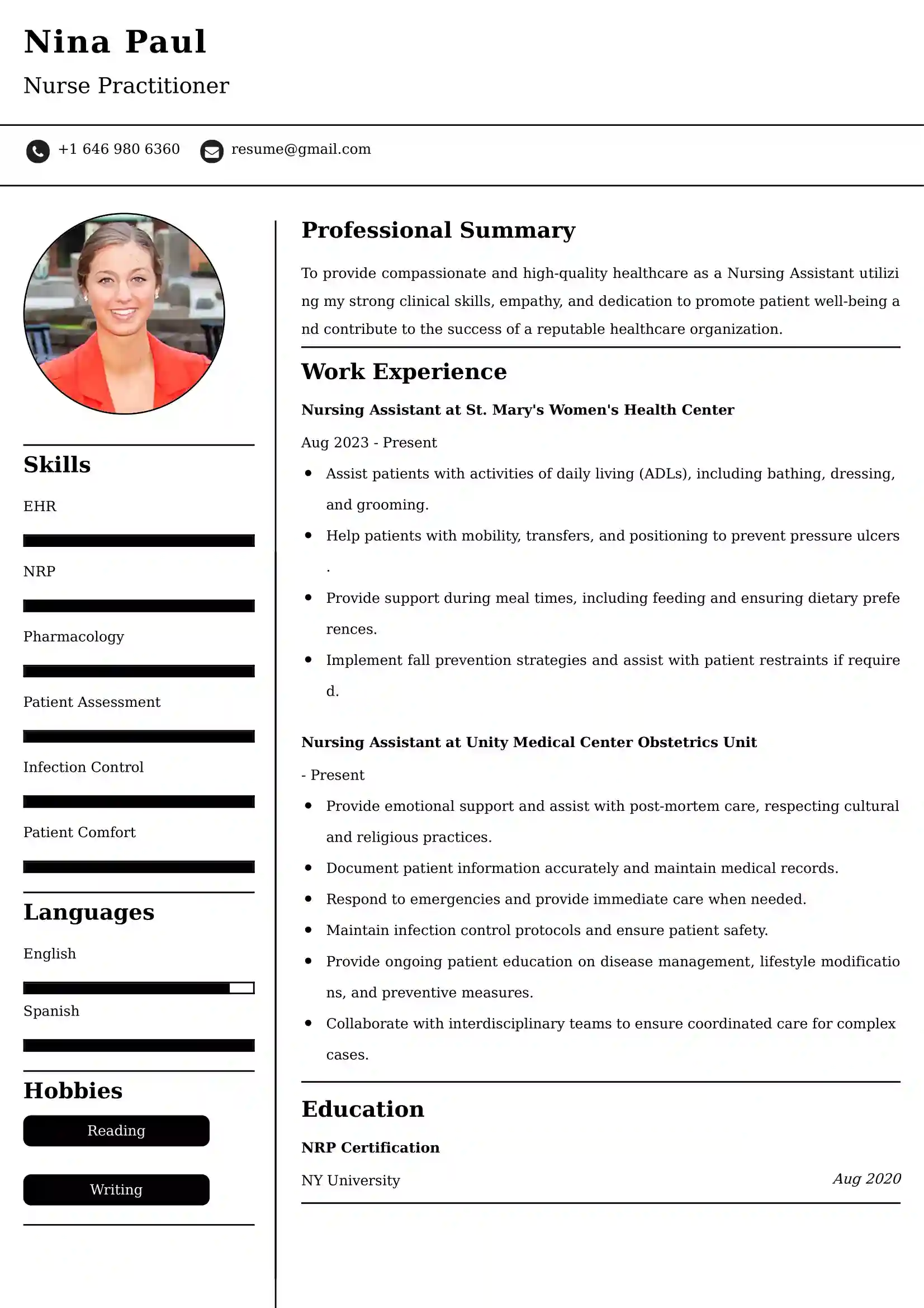Resume
Resume examples for top Nursing Assistant jobs
Use the following guidelines and resume examples to choose the best resume format.
Nursing Assistant Resume Example

About Nursing Assistant Resumes
If you're considering a career as a Nursing Assistant, you're entering a rewarding field dedicated to providing essential support to healthcare teams and improving patient well-being. Crafting an effective resume is your essential first step toward success in this important healthcare role. Your resume serves as your professional introduction to potential employers, showcasing your qualifications and expertise in patient care, assistance with daily living activities, and teamwork in a healthcare setting.
Salary Details (INR)
In India, Nursing Assistant salaries vary based on factors like experience, location, and the healthcare facility. On average, Nursing Assistants can expect to earn between INR 2 lakhs to INR 4 lakhs or more per annum. However, these figures may fluctuate based on individual circumstances and the specific demands of the role.
Key Skills for Nursing Assistant Resumes
When crafting your Nursing Assistant resume, it's essential to emphasize specific key skills that are highly valued in this role. These may include:
- Patient Care: Highlight your ability to provide compassionate care, assist with daily activities, and monitor patients' well-being.
- Communication: Showcase your effective communication skills for interacting with patients, their families, and healthcare professionals.
- Medical Knowledge: Mention your understanding of basic medical terminology, procedures, and the ability to follow healthcare protocols.
- Empathy: Emphasize your compassionate nature and your capacity to provide emotional support to patients in challenging times.
- Teamwork: Highlight your ability to work collaboratively with nurses, doctors, and other healthcare staff.
Do's and Don'ts for Nursing Assistant Resumes
Do's:
- Customize Your Resume: Tailor your resume for each specific job application, emphasizing your relevant qualifications and experiences.
- Highlight Achievements: Focus on accomplishments such as improved patient care, contributions to healthcare teams, and positive patient outcomes.
- Use Action Verbs: Start bullet points in your work experience section with strong action verbs to describe your responsibilities and achievements more vividly.
- Include Certifications: Mention any relevant certifications, such as Certified Nursing Assistant (CNA) or Basic Life Support (BLS), to demonstrate your qualifications.
- Quantify Achievements: Whenever possible, use quantifiable metrics to demonstrate your impact, such as the number of patients assisted or reduced response times.
Don'ts:
- Neglect Proofreading: Carefully proofread your resume to eliminate typos, grammatical errors, and formatting issues.
- Overload with Medical Jargon: Avoid using excessive medical terminology that may be challenging for non-medical readers, including HR professionals.
- Exaggerate or Misrepresent Information: Always be truthful about your qualifications and experiences.
- Omit Continuing Education: If you've completed any relevant courses or workshops, include them in your resume to demonstrate your commitment to professional development.
- Provide References on the Resume: It's not necessary to include references on the resume. Provide them separately when requested by the employer.
Frequently Asked Questions (FAQs) on Resume Formats for Nursing Assistants
- Is it necessary to include a summary or objective statement on my Nursing Assistant resume?
- While optional, a well-crafted summary can provide context and highlight your career goals.
- Should I list my educational background and certifications on my resume?
- Yes, prominently feature your relevant educational qualifications and certifications to demonstrate your expertise.
- Is it necessary to list personal interests or hobbies on my resume?
- While not obligatory, including relevant hobbies or interests can provide insights into your personality.
- How can I demonstrate my commitment to patient-centered care on my resume?
- Mention specific instances where you provided compassionate care, communicated effectively with patients, and contributed to positive patient outcomes in your work experience section.
- Should I include references on the resume?
- Typically, references are not included on the resume. Provide them separately when requested by the employer.
More Resume Examples for the Next Step in Your Nursing Assistant Resume Career jobs
- Acute Care Nurse Resume
- Advanced Practice Rn Resume
- Caregiver Resume
- Er Nurse Resume
- Geriatric Nurse Practitioner Resume
- Labor And Delivery Nurse Resume
- Lpn Resume
- Nurse Practitioner Resume
- Nursing Assistant Resume
- Oncology Nurse Resume
- Pediatric Nurse Resume
- Registered Nurse Resume
- Public School Nurse Resume
- Trauma Nurse Resume
More Cover Examples for the Next Step in Your Nursing Assistant Cover Career jobs
- Acute Care Nurse Cover Letter
- Advanced Practice Rn Cover Letter
- Caregiver Cover Letter
- Chief Nursing Officer Cover Letter
- Er Nurse Cover Letter
- Geriatric Nurse Practitioner Cover Letter
- Labor And Delivery Nurse Cover Letter
- Lpn Cover Letter
- Nurse Practitioner Cover Letter
- Nursing Assistant Cover Letter
- Oncology Nurse Cover Letter
- Pediatric Nurse Cover Letter
- Registered Nurse Cover Letter
- Public School Nurse Cover Letter
- Trauma Nurse Cover Letter
Get started with a winning resume template
800+ Resume Samples in ATS Format, HR Approved for Your Success
Step into the world of resume excellence with our comprehensive collection of 800+ samples, meticulously designed in ATS-friendly format and rigorously approved by HR professionals. Your path to success starts here as you craft a resume that effortlessly navigates through automated systems and captures the attention of hiring experts. Explore now and take the first step towards landing your dream job.
Resume Examples
What clients say about us
Our Resume Are Shortlisted By










